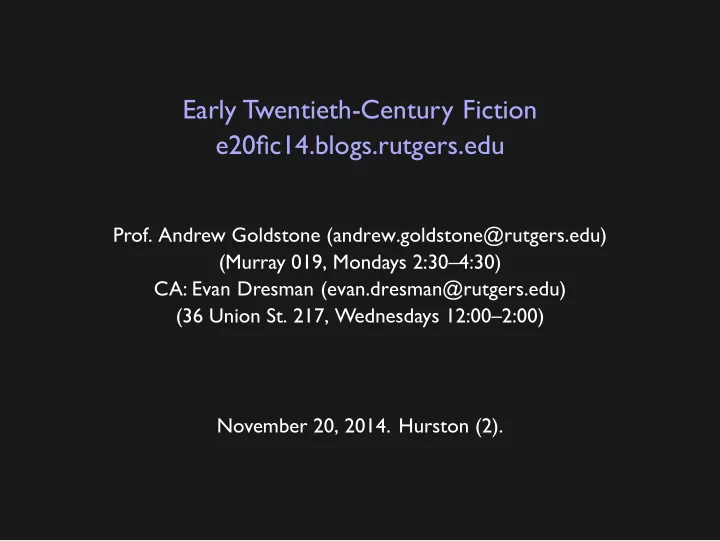

Early Twentieth-Century Fiction e20fic14.blogs.rutgers.edu Prof. Andrew Goldstone (andrew.goldstone@rutgers.edu) (Murray 019, Mondays 2:30–4:30) CA: Evan Dresman (evan.dresman@rutgers.edu) (36 Union St. 217, Wednesdays 12:00–2:00) November 20, 2014. Hurston (2).
logistics ▶ class meets Monday and Tuesday next week ▶ papers due Monday at 5 p.m. on Sakai ▶ finish the novel; no commonplacing required ▶ read Alice Walker, “In Search of Zora Neale Hurston” (optional but strongly recommended)
dilemmas of the American Museum of Natural History from dialect to narrator’s idiolect—and back review ▶ is Their Eyes proletarian fiction? (working class matter? collective subject? agitational form?)
from dialect to narrator’s idiolect—and back review ▶ is Their Eyes proletarian fiction? (working class matter? collective subject? agitational form?) ▶ dilemmas of the American Museum of Natural History
review ▶ is Their Eyes proletarian fiction? (working class matter? collective subject? agitational form?) ▶ dilemmas of the American Museum of Natural History ▶ from dialect to narrator’s idiolect—and back
free indirect (1) Janie noted that while he didn’t talk the mule himself, he sat and laughed at it….Joe would hustle her off inside the store to sell something. Look like he took pleasure in doing it. Why couldn’t he go himself sometimes? She had come to hate the inisde of that store anyway. That Post Office too. People always coming and asking for mail at the wrong time…. But Joe kept saying that she could do it if she wanted to and he wanted her to use her privileges. That was the rock she was battered against. (54)
free indirect (2) At the newel post Janie whirled around and for the space of a thought she was lit up like a transfiguration. Her next thought brought her crashing down. He’s just saying anything for the time being, feeling he’s got me so I’ll b’lieve him. The next thought buried her under tons of cold futility. He’s trading on being younger than me. Getting ready to laugh at me for an old fool. But oh, what wouldn’t I give to be twelve years younger so I could b’lieve him! (105)
“Mouth-Almighty” “Folkses, de sun is goin’ down. De Sun-maker brings it up in de mornin’, and de Sun-maker sends it tuh bed at night. Us poor weak humans can’t do nothin’ tuh hurry it up nor to slow it down. All we can do, if we want any light after de settin’ or befo’ de resin’, is tuh make some light ourselves. So dat’s how come lamps was made.” (45)
communal speech Davis chanted a traditional-prayer poem with his own variations…. Mrs. Bogle’s alto burst out in: We’ll walk in de light, de beautiful light Come where the dew drops of mercy shine bright Shine all around us by day and by night Jesus, the light of the world They, all of them, all of the people took it up and sung it over and over until it was wrung dry, and no further innovations of tone and tempo were conceivable. (45–46)
the pleasures of talk But sometimes Sam Watson and Lige Moss forced a belly laugh out of Joe himself with their eternal arguments. It never ended because there was no end to reach. It was a contest in hyperbole and carried on for no other reason…. “Whut is it dat keeps uh man from gettin’ burnt on uh red-hot stove— caution or nature?”… “How is de son gointuh be before his paw? Nature is de first of every- thing. Ever since self was self, nature been keepin’ folks off of red-hot stoves.” (63–65)
the threat of talk “Mouth-Almighty is still sittin’ in de same place.” (5) “I god, where’s de Mayor?” (34)
ambivalent tradition “Honey, de white man is de ruler of everything as fur as Ah been able tuh find out. Maybe it’s some place way off in de ocean where de black man is in power, but we don’t know nothin’ but what we see. So de white man throw down de load and tell de nigger man tuh pick it up. He pick it up because he have to, but he don’t tote it. He hand it to his womenfolks. De nigger woman is de mule uh de world so fur as Ah can see. Ah been prayin’ fuh it tuh be different wid you. Lawd, Lawd, Lawd!” (14)
who will speak? (1) It is the great merit of Miss Hurston’s work that she entered into the homely life of the southern Negro as one of them and was fully accepted as such by the companions of her childhood. Thus she has been able to penetrate through that affected demeanor by which the Negro excludes the White observer effectively from participating in his true inner life. (Franz Boas, foreword to Mules and Men [1935])
who will speak? (2) When it was all done she stood in front of Joe and said, “Jody, dat wuz uh mighty fine thing fuh you tuh do. ’Tain’t everybody would have thought of it, ’cause it ain’t no everyday thought. Freein’ dat mule makes uh mighty big man outa you….” Hambo said, “Yo’ wife is uh born orator, Starks. Us never knowed dat befo’. She put jus’ de right words tuh our thoughts.” (58)
who will speak? (3) “Ah knowed you wasn’t gointuh lissen tuh me.”… She thought back and forth about what had happened in the making of a voice out of a man. (86–87) Discussion Consider Joe’s death scene. Does Janie find an alternative to the voice of power? What details suggest the possibilities?
introduction workshops (see handout)
Recommend
More recommend